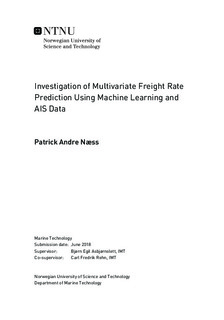Investigation of Multivariate Freight Rate Prediction Using Machine Learning and AIS Data
Master thesis
Permanent lenke
http://hdl.handle.net/11250/2564498Utgivelsesdato
2018Metadata
Vis full innførselSamlinger
- Institutt for marin teknikk [3471]
Sammendrag
This thesis investigates whether multivariate machine learning forecasting methods, using information extracted from Automatic Identification System (AIS) data, add additional information in predicting short-term freight rates. The focus in this thesis is the Liquid Petroleum Gas (LPG) shipping market, directed on the prediction of the Mont Belvieu propane spot price. Forecasting LPG spot prices is challenging due to a comparatively small fleet, niche trading patterns and cargo bases, creating high volatility. Nonetheless, anticipating fluctuations in freight rates is a crucial element to long-term profitability for both operators and shipowners.
A thorough literature review is presented to investigate the state-of-the-art within the topic. The data used in this research is provided by the Norwegian Coastal Authorities and Equinor. Several methods are proposed to extract and create predictive features. A significant amount of market specific features are generated and tested with selection methods to identify the most powerful predictors of the Mont Belvieu propane spot price.
Two machine learning models are employed; the Multilayer Perceptron (MLP) and Long Short-Term Memory (LSTM) neural networks. To baseline the results, the no-change persistence model and the Vector Autoregressive (VAR) model are utilized, where the latter is widely used for multivariate forecasting in maritime econometrics. By optimizing the neural network architectures with a genetic algorithm, the LSTM-model is identified to perform better than the baseline model and the traditional multivariate VAR-model. Moreover, the results indicate that both the machine learning and traditional models with information extracted from AIS data are able to predict short-term fluctuations in freight rates more accurately than without this information.
In conclusion, there is evidence in favor of using information extracted from AIS data in short-term freight rate prediction. Furthermore, the results also suggest favorability of using multivariate machine learning forecasting models over traditional models. This thesis suggests that further work within the use of AIS data in the context of maritime econometrics is recommended. After surveying the performance in the case study, it is finally recommended to investigate whether the approach used in this study can be readily applied to other ocean freight industries.
